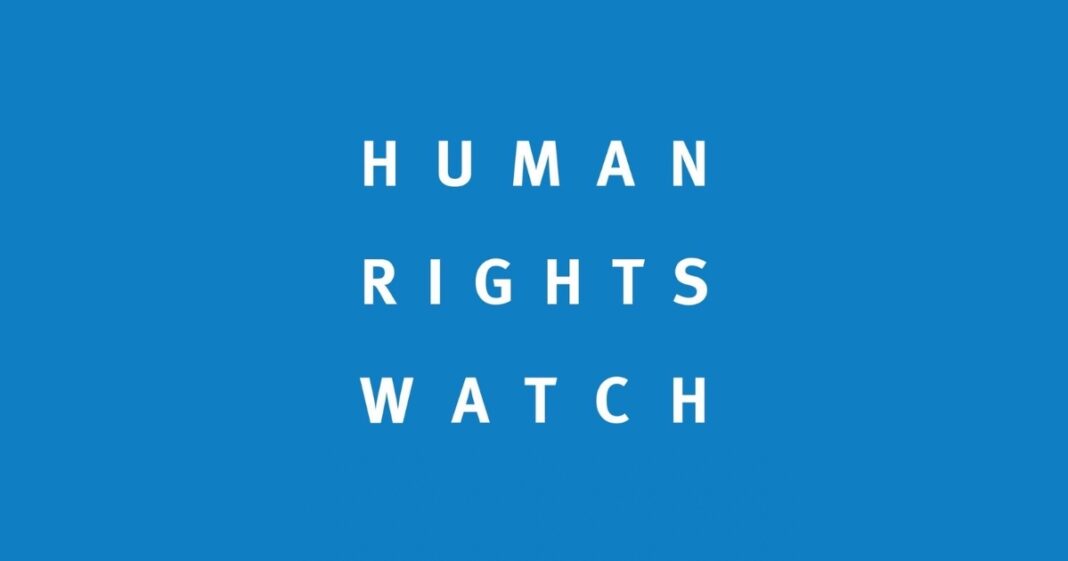Ex-President Charged with Crimes Against Humanity
The arrest of former Philippine President Rodrigo Duterte and his transfer to the International Criminal Court (ICC) in The Hague is a historic step toward justice, Human Rights Watch said today.
On March 11, Philippine authorities acting on an arrest warrant that the ICC issued and sent to Interpol, arrested Duterte in Manila.
The ICC sought Duterte’s arrest on a crimes against humanity charge in relation to alleged extrajudicial killings occurring between 2011 and 2019.
President Ferdinand Marcos Jr. confirmed that an aircraft carrying Duterte to The Hague left Manila’s Ninoy Aquino International Airport at 11:03 p.m.
“Former President Duterte’s arrest and transfer to The Hague is a long-overdue victory against impunity that could bring victims and their families a step closer to justice,” said Bryony Lau, deputy Asia director at Human Rights Watch. “This momentous event sends a message to human rights abusers everywhere that one day they could be held to account.”
‘WAR ON DRUGS’
According to Human Rights Watch, “the arrest warrant against Duterte contains allegations about extrajudicial killings during his years as mayor of Davao City, and the brutal nationwide ‘war on drugs’ after he became president in 2016.”
Citing official police statistics, Human Rights Watch said that “more than 6,000 Filipinos were killed in the ‘drug war,’ mostly impoverished people in urban areas. Human rights groups in the Philippines contend the number is more than 30,000 people. Many children were among those killed or suffered from the harmful consequences of Duterte’s anti-drug campaign.”
The human rights organization added: “Officers of the Philippine National Police or their agents raided homes at night without warrants, arresting and then executing suspects, and frequently planting evidence to justify their acts. A very small number of the thousands of cases have been investigated or prosecuted, with only four cases resulting in convictions, all of low-ranking police officers for extrajudicial killings.”
Reports on gross human rights violations prompted the ICC’s Office of the Prosecutor to open a preliminary examination into the situation in the Philippines.
President Duterte withdrew the Philippines from the ICC’s founding treaty, the Rome Statute, in March 2018. The withdrawal took effect one year later.
Under the Rome Statute, the ICC retains jurisdiction over crimes committed prior to withdrawal. Former ICC prosecutor Fatou Bensouda announced the opening of a formal investigation in 2021.
SHIFT IN GOV’T POSITION
In recent years, the Philippine government has shifted its position on the ICC investigation.
Initially, the Marcos administration, which took office in 2022, challenged the court’s jurisdiction over the alleged offenses. After a political falling out between the Marcos and Duterte camps in 2024, the “Marcos administration toned down its rhetoric on the ICC and stated in November that it would work with Interpol, the international criminal police organization, if an arrest warrant were issued,” Human Rights Watch said.
At a time when the ICC itself is under attack by some governments, most recently by US President Donald Trump’s decision to sanction the court’s prosecutor, the arrest of Duterte and his transfer to The Hague affirms the court’s relevance and underscores its significance in ensuring accountability for grave crimes, Human Rights Watch added.
“President Marcos should now take further steps to address continuing human rights violations in the Philippines, including more recent extrajudicial killings and attacks against activists and civil society groups. The Philippine government should also rejoin the ICC, a step that an increasing number of Filipinos support,” Lau said.
He further stated: “President Marcos has begun to chip away at the longstanding impunity for drug-related killings in the Philippines. He should follow through by rescinding Duterte’s orders that unleashed the ‘war on drugs,’ and prioritize comprehensive reforms of the Philippines police.”


